Supply Chain
Basic policy
As a Group that develops diverse businesses globally, protecting supply chains is a fundamental concept that serves as the foundation of our management and is aligned with our mission of "passing on a better Earth to the children of the future."
The Toyota Tsusho Group has formulated the Supply Chain Sustainability Behavioral Guidelines, disseminates the guidelines to suppliers, and asks them to put the guidelines into practice. We have also established our "Approach to Responsible Procurement," under which we conduct procurement with consideration for negative impacts on the environment and society, while strengthening supply chain management. We strive to assess risks and identify issues through due diligence, and if issues are identified, we work to make improvements through dialogue with suppliers.
Going forward, we will make efforts to build a sustainable supply chain that takes human rights, labor environments, and the natural environment into consideration together with our suppliers.
Toyota Tsusho Group Supply Chain Sustainability Behavioral Guidelines
【1】Supply Chain Sustainability Behavioral Guidelines
- 1Respect for human rights
- We understand and support the "Toyota Tsusho Group Human Rights Policy," and will strive to put it into practice.
- We will respect the human rights of employees and will never subject employees to inhumane treatment, such as abuse, physical punishment, or harassment.
- We will endeavor to identify potential adverse impacts on human rights in business activities, and work to prevent or mitigate such impacts through a human rights due diligence framework.
- 2Prevention of forced labor and child labor
- We do not tolerate any form of modern slavery, we prohibit forced labor and we recognize that all work is voluntary. Additionally, we guarantee the right of employees to freely terminate their employment.
- As part of the hiring process, we will provide all employees with an employment contract written in their native language that includes employment terms in full compliance with all applicable laws and regulations.
- When employing migrant workers, including foreign nationals, we will strive to prevent practices that may lead to forced labor, such as requiring the surrender of official identity documents or work permits, or charging recruitment fees and other expenses that are considered inappropriate under international norms.
- We do not tolerate child labor and do not allow children to work from a young age as it deprives them of educational opportunities and impedes their development.
- The working age for employees shall be from 15 years old, or the minimum working age according to the relevant laws and regulations of each country, or the age at the end of compulsory education, whichever is the greatest, will apply.
- For hazardous work, we do not utilize employees under the age of 18.
- We allow labor in the form of vocational training and apprenticeships only within the scope permitted by the applicable laws and regulations of each country.
- 3Prevention of Excessive Working Hours and Unfair Low Wages
- We will appropriately manage employees’ working hours (including overtime), holidays and leave, and strive to reduce excessively long working hours. In addition, we will pay wages that exceed the living wage in compliance with the labor laws of each country and will not reduce wages unreasonably.
- We will ensure strict compliance with maximum working hours as defined by the company, in addition to observing statutory working hour limits in each country.
- We will comply with all applicable wage-related laws and regulations in each country, including those governing overtime and legally mandated benefits. We will not engage in unfair wage deductions, and will strive to provide wages that exceed both the legal minimum wage and a living wage.
- 4Elimination of Discrimination and Harassment
- We will not engage in any form of discrimination or harassment based on gender, age, place of origin, nationality, race, color, ethnicity, religion, gender identity, sexual orientation, pregnancy, disability, political opinion, or any other status.
- 5Respect for freedom of association
- We recognize, support and respect the right of employees to freely associate or not to associate based on applicable laws and regulations of the countries in which we are engaged in business activities.
- We guarantee the right of employees to communicate openly and directly with management without fear of retaliation, intimidation, or harassment.
- 6Improvement of working environment
- We will strive to provide a safe, hygienic and healthy work environment, especially by prioritizing employee health and safety.
- We will utilize occupational healthy and safety management systems to maintain and further improve safety and hygiene standards.
- We will provide all employees with the necessary and sufficient healthy and safety education and training in appropriate languages to promote a comfortable and healthy working environment.
- We will conduct training and implement measures in appropriate languages to minimize harm to life, the environment, and property in emergencies, including the installation of proper fire alarms, fire extinguishing equipment, and emergency exits.
- We will identify and assess physically demanding tasks and safety hazards related to production machinery and other equipment, and manage them appropriately by complying with relevant laws and regulations and implementing physical protective measures.
- We will support employee health through initiatives such as providing opportunities for health promotion and raising awareness about disease prevention.
- 7Consideration of the global environment
- We understand and support the “Toyota Tsusho Group Environmental Policy” and will strive to put it into practice.
- We will comply with international declarations, agreements, conventions related to environmental conservation, as well as environmental laws and regulations, and industry standards in the countries and regions where we operate.
- We will address climate change and aim to achieve carbon-neutral society.
- We will manage water resources to ensure their sustainable use.
- We will balance biodiversity conservation with business activities and contribute to the realization of nature-positive outcomes.
- We will work to control, reduce, and eliminate air pollution, water pollutants, and soil contamination.
- We will respond appropriately to chemical substances by substituting or minimizing the use of hazardous materials.
- We will contribute to building a sustainable society through resource recycling and effective waste management.
- We will establish environmental management systems and pursue kaizen (continuous improvement).
- We will promote environmental awareness among stakeholders through environmental education.
- We will engage with society and collaborate with stakeholders to address environmental issues.
- We will disclose environmental information proactively and share it widely with society.
- We will strive to take a multifaceted approach to addressing complex environmental issues.
- 8Fair trade and anti-corruption
- We will ensure thorough adherence to applicable laws and international rules, and promote fair business practices and anti-corruption measures, including the prevention of conflicts of interest, anti-competitive behavior, and bribery, as well as compliance with export/import procedures and tax obligations.
- 9Ensure quality and safety
- We ensure quality and safety of products and services.
- 10Contribution to local communities
- We will protect the rights and lifestyles of local communities and contribute to those communities as a member thereof.
- 11Responsible Procurement
- We understand, support, and strive to implement the “Toyota Tsusho Group’s Approach to Responsible Procurement,” and conduct procurement activities that consider potential adverse impacts arising from the use of products associated with environmental and social issues.
- 12Information Security
- We will strictly manage confidential and personal information, ensure it is used appropriately within defined limits, and protect it accordingly.
- We will protect intellectual property rights owned by or attributable to the company.
【2】Establishing a Management System for Environmental and Social Responsibility
- 13Responsibility of Management
- Management shall approve the company’s policies on environmental and social responsibility, designate responsible personnel, and establish a management system to implement related activities.
- Management shall regularly evaluate the effectiveness of activities conducted under the established management system.
- 14Kaizen (continuous improvement) Objectives
- We will set clear objectives and action plans related to environmental and social responsibility, and evaluate them on a regular basis.
- 15Education and Training
- We will provide ongoing training programs for employees to implement our policies, initiatives, and objectives in accordance with these Guidelines.
- 16Grievance Mechanism
- We will strive to establish mechanisms for reporting and handling concerns and grievances from all stakeholders regarding actual or suspected violations of international codes of conduct or relevant domestic standards.
- 17Information disclosure
- We will disclose information related to the matters listed above in a timely and appropriate manner.
- 18Engagement with Stakeholders
- We will promote mutual understanding and the development and maintenance of trust-based relationships with stakeholders.
【3】Compliance with These Guidelines
- 19Monitoring
- We will work together with our suppliers to support the continuous improvement of their environmental and social responsibility initiatives and performance. We will deepen communication with our suppliers and conduct regular surveys of our suppliers in order to understand the status of compliance with these guidelines. Further, we will visit suppliers to confirm activities on site as we deem necessary based on the activity area and business content. If monitoring is conducted in the form of a third-party audit, we kindly ask for your cooperation.
- 20Remedy
- If any issues arise that are contrary to these Guidelines, please report them promptly and work together with us to pursue kaizen (continuous improvement).
We may reconsider our transactions with your company if we do not observe appropriate efforts to make improvements.
- If any issues arise that are contrary to these Guidelines, please report them promptly and work together with us to pursue kaizen (continuous improvement).
Formulated in April 2012
Revised in March 2022
Revised in July 2025
President & CEO
Toshimitsu Imai
Toyota Tsusho Group's Approach to Responsible Procurement
Our Toyota Tsusho Group mission declares: “Passing on a better Earth to the children of the future,” and we are committed to addressing social issues through business activities.
This document has been formulated to guide our procurement activities with the aim of fulfilling our corporate social responsibility related to our business and realizing a sustainable supply chain, by considering the potential negative impacts of using products associated with environmental and social concerns.
Policy
We are committed to implementing the following initiatives and expect our business partners, including suppliers, to understand and act upon them. Through such collaboration, we aim to build a sustainable supply chain.
- Ensuring compliance with the laws and regulations of the countries and regions in which we operate, and promoting fair trade and thorough anti-corruption measures that consider international rules and customs
- Considering environmental impacts, including the conservation of ecosystems and water resources in the countries of origin, as well as the management of chemical substances
- Respecting international norms such as the United Nations Guiding Principles on Business and Human Rights and the Universal Declaration of Human Rights
- Complying with all applicable laws relating to internationally recognized labor rights, including the ILO Core Conventions
- Respecting the rights and cultures of Indigenous Peoples in accordance with international standards, including the “United Nations Declaration on the Rights of Indigenous Peoples,” the “Indigenous and Tribal Peoples Convention (ILO No. 169),” and the principle of Free, Prior and Informed Consent (FPIC)
- Promoting procurement in accordance with the NDPE (No Deforestation, No Peat, No Exploitation) principle
- Promoting traceability assurance for products associated with environmental and social concerns
Scope of Application
This policy applies to Toyota Tsusho Corporation and our consolidated subsidiaries.
We also expect our business partners, including suppliers, to understand and comply with this policy.
Initiatives for Products Associated with Environmental and Social Concerns
The Toyota Tsusho Group identifies products that are associated with environmental and social concerns in accordance with the laws and regulations of each country and region, as well as international norms.
For suppliers that handle such products, we conduct questionnaire-based surveys and on-site audits by third-party experts to help identify relevant issues. If any issues are found, we will take steps to prevent or mitigate them.
Disclosure of Information
We strive to disclose information regarding the implementation of initiatives based on this document in a timely and appropriate manner.
The above content was reported at the Toyota Tsusho Corporation Board of Directors meeting on July 31, 2025.
Progress on the implementation of this document is reviewed by the Sustainability Committee, and reports are submitted to the Board of Directors meeting as necessary.
This policy will be reviewed periodically in consideration of external trends and revised as necessary.
Formulated in July 2025
【Products Associated with Environmental and Social Concerns】
Antimony, Aluminum/Bauxite, Beryllium, Bismuth, Cobalt, Copper, Gallium, Germanium, Scandium, Neodymium, Praseodymium, Terbium, Dysprosium, Gadolinium, Samarium, Cerium, Yttrium, Lanthanum, Promethium, Europium, Holmium, Erbium, Thulium, Ytterbium, Lutetium, Lithium, Magnesium, Manganese, Natural graphite, Nickel, Niobium, Platinum, Titanium, Vanadium, Tantalum, Tungsten, Gold, Tin, Chromium, Molybdenum, Mica, Zinc, Lead, Rhodium, Ruthenium, Silver, Iron/Steel, Palladium, Soy, Cacao, Coffee beans, Beef, Wood, Glass, Plastic, Leather, Natural rubber, Palm oil
Supply Chain Due Diligence
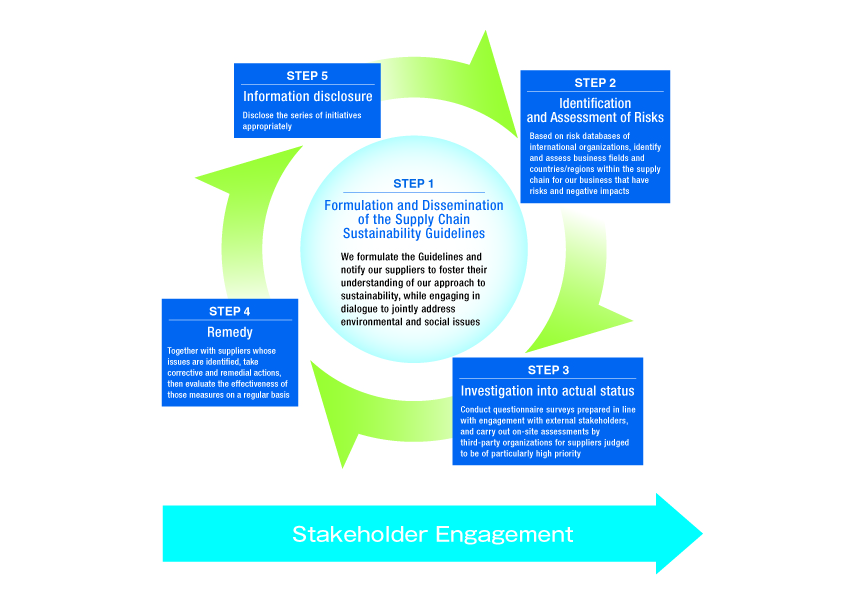
Dissemination of the Supply Chain Sustainability Behavioral Guidelines
In 2012, Toyota Tsusho formulated the Supply Chain CSR Behavioral Guidelines to foster a common understanding of sustainability, coordinate CSR initiatives, and realize mutual sustainable growth with suppliers. These guidelines were revised in 2019 and 2022 to clarify the common understanding we have with our suppliers in response to the increased awareness of human rights and environmental issues.
These guidelines were revised in 2019 to clarify the common understanding we have with our suppliers in response to increased awareness of human rights and environmental issues. In 2022, the name was changed to the "Supply Chain Sustainability Behavioral Guidelines."
In the 2025 revision, we reflected the issues identified through the supplier human rights due diligence initiated in fiscal year 2023 and, with reference to the RBA* Code of Conduct, stipulated the establishment of management systems by suppliers' senior management.
Since 2022, in line with the revisions to these guidelines, we once again communicated them to approximately 6,000 suppliers of Toyota Tsusho and our domestic and overseas consolidated subsidiaries, requesting their implementation. In cases where there are breaches of the guidelines, we strive to understand the present conditions and causes, provide corrective advice and solutions, and will continue to request suppliers' understanding and compliance.
The content of these guidelines is reported to the Board of Directors meeting, and we will continue to update them as appropriate in response to changes in the external environment.
- *Responsible Business Alliance (RBA: An international non-profit organization dedicated to improving corporate social responsibility in global supply chains)
Addition of sustainability clauses to contracts
In June 2022, we added a sustainability clause to the template of our Basic Sale and Purchase Agreement. The sustainability clause requires suppliers to comply with our Supply Chain Sustainability Behavioral Guidelines as well as our Human Rights Policy and Environmental Policy referenced therein. We are promoting the use of this clause in contracts and review it as necessary. In cases where suppliers breach the sustainability clause, we strive to understand the present conditions and causes and request corrective action. If the violation continues without being corrected within a certain period specified by the Company, we may consider termination of the contract.
Supplier Screening
Since July 2024, we have been operating a system to identify and assess sustainability risks of business partners at the start of new transactions, and, when necessary, conduct questionnaires and on-site surveys. Based on data from international organizations, we prepare country- and product-specific risk scores, and by evaluating the risks according to the partner's country of operation and the products handled, we carry out supplier screening.
Pre-investment and loan investigations
For new investment and loan projects, we investigate the impact that the business will have on the environment and social.
Human Rights Due Diligence for the Supply Chain
Referring to the United Nations' Guiding Principles on Business and Human Rights, we are conducting human rights due diligence covering the supply chain based on the opinions of internal and external experts. We conduct risk assessments in the supply chain, and for suppliers in high-risk fields and regions, we carry out questionnaires and on-site surveys by third-party specialized organizations to identify, avoid, prevent, and mitigate adverse impacts on human rights.
Evaluation and Identification of Human Rights Risks
Taking into account the opinions of internal and external experts, we conduct risk assessments along two axes: the country of supplier operation and the products handled. In conducting these assessments, we considered transaction volume with suppliers and our purchasing share, and referred to human rights risk data from international organizations to analyze human rights issues of high priority for our business. In the fiscal year ended March 31, 2024, we conducted risk assessments of approximately 6,000 Tier 1 suppliers in the Group and identified 251 high-risk suppliers. We define these 251 suppliers, which present high ESG-related risks, as “critical suppliers.”
On-site Surveys
For the 251 suppliers in fields and regions assessed as having high human rights risks, we conducted our own questionnaire to examine their sustainability policies, initiatives, and supplier engagement. As of the end of June 2025, on-site surveys had been completed for approximately 35 suppliers. To ensure both objectivity and expertise, these surveys are carried out by third-party organizations accredited by standard-setting bodies and possessing specialized knowledge. The survey items are based on the Code of Conduct of the Responsible Business Alliance (RBA), an international non-profit organization dedicated to improving corporate social responsibility in global supply chains, and are developed with input from external experts to confirm the systems and practices addressing human rights issues prioritized by Toyota Tsusho.
| 1. Forced labor | 6. Working hours |
| 2. Child labor | 7. Suitable remuneration |
| 3. Safe and healthy working environment | 8. Anti-corruption |
| 4. Freedom of association | 9. Establishment of whistleblowing hotline and protection of whistleblowers |
| 5. Prohibition of discrimination and harassment | 10. Supplier engagement |
Scenes from On-site Surveys
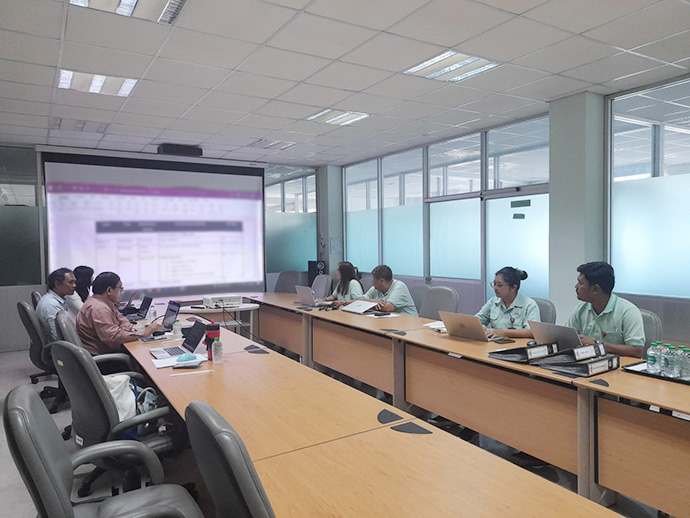
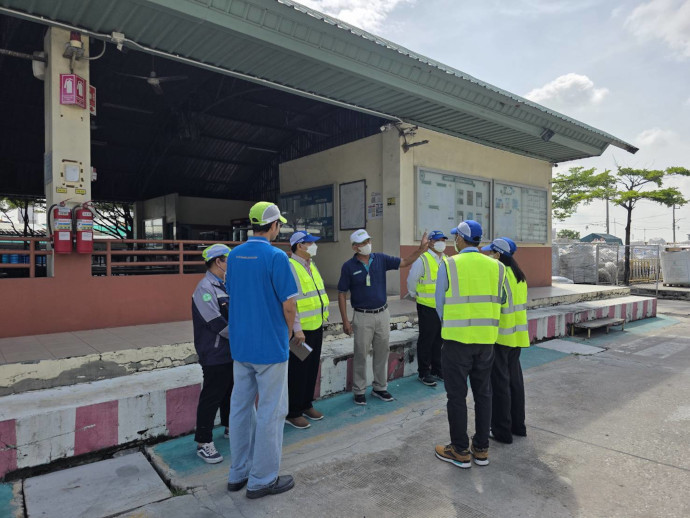
Remediation and Remedy
As of the end of June 2025, on-site surveys had been conducted for 35 suppliers. No serious human rights issues that threaten lives were identified, but multiple human rights issues were confirmed at 31 suppliers. For the issues identified, we request suppliers to formulate corrective action plans and implement improvement measures or countermeasures within a certain period specified by the Company, and, where necessary, we collaborate with them to achieve improvements.
| Category | Examples of issues | Improvement status |
|---|---|---|
| Young labor | •Internship participants engaged in overtime work or night shifts | Improvement plans were formulated, and the issues were resolved within the period specified by the Company |
| Wages | •No premium allowances were paid for late-night or holiday work | |
| Working hours | •Total weekly working hours exceeded the statutory limit | |
| Occupational health and safety | •No fire alarms or fire extinguishers were installed | |
| Business ethics | •No training was conducted on the prevention of corruption and bribery |
Future Initiatives
Through the Group's supply chain human rights due diligence, initiated in the fiscal year ended March 31, 2024, we have identified human rights risks at multiple suppliers and reflected these issues in our Supply Chain Sustainability Behavioral Guidelines with the aim of avoiding, preventing, and mitigating them. Going forward, we will once again notify approximately 6,000 suppliers of Toyota Tsusho and our domestic and overseas consolidated subsidiaries of these guidelines and request their implementation.
In addition, we will identify products that are highlighted in reports issued by international standards or by international organizations closely related to our business as being associated with environmental and social issues, and we will work to identify, avoid, prevent, and mitigate such risks at the suppliers handling these products. By continuing initiatives and improvements in line with the human rights due diligence process, we will contribute to the realization of a sustainable supply chain.
Environmental Due Diligence for Supply Chains
Similar to human rights due diligence, we have also started initiatives for environmental due diligence targeting our supply chain.
In the fiscal year ending March 2024, to raise awareness of our environmental approach, we held briefing sessions on our environmental policy for key suppliers in our main businesses.
In the fiscal year ending March 2025, we began examining the design of environmental risk assessments for suppliers and measures to address high-risk suppliers. Going forward, we will identify high-risk suppliers and advance environmental due diligence across the supply chain.
Other Supply Chain Investigations
In 2022, a university report raised allegations that Toyota Tsusho had been handling steel products from Baowu Group Xinjiang Bayi Iron & Steel Co., Ltd., where forced labor was suspected in the Xinjiang region of China. In response to this report, we conducted a supply chain investigation, which confirmed that there were no direct or indirect transactions with the company concerned. We will continue to promote responsible procurement that takes human rights and environmental issues into account throughout the entire supply chain.
Grievance Mechanism
Consultation Desk for Supply Chains
As a grievance mechanism (a system for receiving complaints and implementing appropriate corrective and remedial actions), Toyota Tsusho is a full member of the Japan Center for Engagement and Remedy on Business and Human Rights (JaCER), a general incorporated association that provides a "Dialogue and Remedy Platform" in accordance with the United Nations Guiding Principles on Business and Human Rights. Through this membership, we provide remedies to individuals and local communities affected by sustainability-related issues, including human rights and environmental concerns.
The grievance mechanism is available to all stakeholders-both internal and external-including employees of the Toyota Tsusho Group and suppliers. Reports of actual or suspected violations of international codes of conduct, national regulations, or other standards related to sustainability-including human rights and environmental issues-can be submitted 24 hours a day, 365 days a year via the complaint form on JaCER's official website.
Upon receiving a report, Toyota Tsusho conducts an investigation, and if it is determined that our business activities have caused or contributed to adverse impacts, we will take corrective and remedial actions through appropriate procedures and dialogue.
By accepting complaints through a third-party channel, we aim to ensure fairness and transparency in the grievance process, promote dialogue and remedy more effectively than before, and address fundamental human rights issues. The reporting system also guarantees the anonymity of the whistleblower and the confidentiality of the report.
Periodic updates of information in response to the report through JaCER, including the nature of the report and its status, will be disclosed on the website of JaCER while ensuring the anonymity of whistleblowers.
Establishment of an Inquiry Page for Sustainability
Establishment of an Inquiry Page for Sustainability We have established a system to accept opinions and requests from suppliers through an inquiry page on our website. The opinions and requests we receive are shared with the relevant departments within the company through a specialized organization and are linked to initiatives aimed at solving issues.
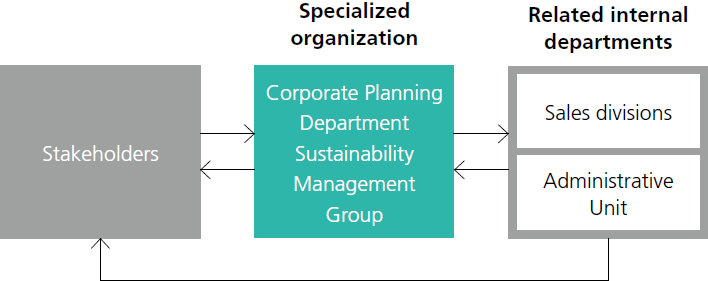
Education, Training, and Awareness
Education, training, and awareness raising regarding supply chain management within our group
We conduct training programs, including e-learning, for all employees to raise awareness about building a sustainable supply chain.
| 2019 | To raise employee awareness of environmental and human rights considerations throughout the supply chain, we implemented company-wide e-learning on supply chain management. More than 3,000 employees from the standalone entity completed the training. |
|---|---|
| 2020 | We conducted company-wide e-learning on overall sustainability, including our Human Rights Policy and content related to respect for human rights. Approximately 3,100 employees from the standalone entity completed the training. |
| 2021 | We held a briefing session for sustainability representatives of overseas consolidated subsidiaries on our sustainability initiatives and supply chain management, and conducted a study session on human rights for certain consolidated subsidiaries. |
| 2022 | We will continue these initiatives. |
| 2023 | To advance human rights due diligence across the supply chain, we implemented company-wide e-learning on human rights due diligence. Approximately 3,100 employees from the standalone entity completed the training. |
| 2024 | We implemented company-wide e-learning covering an overview of our supply chain human rights due diligence initiatives and case studies of human rights violations that occurred at companies closely related to our business. Approximately 3,800 employees from the standalone entity completed the training. In addition, the previous year’s human rights due diligence training was rolled out to all domestic affiliates and overseas consolidated subsidiaries. Furthermore, we have provided human rights e-learning to employees newly assigned to work abroad. |
Training for suppliers
Regarding training for suppliers, the Sustainability management group of the Corporate Planning department provides training to sales representatives on social and environmental issues. Based on this, sales representatives are progressively conducting study sessions for suppliers identified as having high environmental and social risks, covering our Supply Chain Sustainability Behavioral Guidelines and Environmental Policy. (Ideally, these sessions would be followed by internal training for supplier employees.)
In particular, for safety promotion, the Safety and Environmental Promotion Department offers access to the “ Practical Safety Workshop” located within our group company, Toyota Steel Center Co., Ltd. This facility is available not only to employees of our group companies but also to supplier employees, as part of our efforts to eliminate occupational accidents across the entire supply chain.
Additionally, in the first half of FY2025, we independently developed training materials focused on four compliance themes highlighted in our Supply Chain Sustainability Behavioral Guidelines: “Compliance with Laws and International Norms,” “Fair Trade and Anti-Corruption,” “Information Security and Privacy,” and “Intellectual Property.” These materials explain definitions, examples of risks, past cases and their impacts, and measures to prevent and mitigate such risks. We are currently considering distributing these materials to suppliers for use in their internal training programs.
External Collaboration
Initiatives at NovaAgri
Nova Agri (Brazil), our group company engaged in grain originations and infrastructure business, is committed to sustainable grain procurement.
To ensure sustainability throughout its supply chain, the company uses remote sensing technology and geographic information systems to monitor the farmland where the grain it collects is produced, and carefully selects suppliers by matching its own database of farmers with information on environmental violations published by government agencies and other organizations.
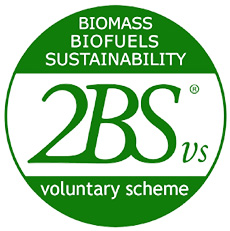
2BSvs Certification
2BSvs certification is the European standard certification for sustainable biomass and biofuels.
NovaAgri obtained 2BSvs certification in May 2022 and started sales of its grain as grain produced and collected in an environmentally friendly manner.
The main conditions for certification and control items are as follows
- Farmers must be located outside 10 km of an Amazonian protected area (including indigenous residential areas).
- Reports on the history of herbicides, insecticides, fungicides, seeds, fertilizers, diesel, and electricity used in the cultivation.
RTRS(Round Table on Responsible Soy Association)
RTRS is an international initiative that includes certification for responsible soybean production and distribution.
NovaAgri is certified to deliver the values of RTRS throughout the supply chain and supports activities related to RTRS.
Procurement of Sustainable Palm Oil
We joined the Roundtable on Sustainable Palm Oil (RSPO) in May 2015. We are promoting the procurement of sustainable palm oil with consideration for environmental impacts by participating in meetings and briefings.
Fairtrade Initiatives
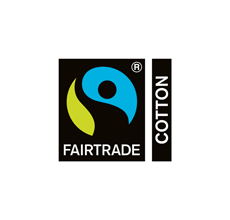
We are working to supply uniforms made of Fairtrade certified cotton as a trade system to improve the lives of producers and workers in developing countries and help them become self-reliant.
In 2018, we became the first company in Japan to adopt Fairtrade certified cotton for our corporate uniforms.
By adopting Fairtrade certified cotton, we aim to improve the working environment and the lives of the people working in the production areas of our supply chain.

Toyota Tsusho has also established “COTTON ∞ (cotton eight)” to raise awareness and expand the use of Fairtrade certified cotton.
COTTON ∞ is Toyota Tsusho's trademarked original brand that uses at least 8% Fairtrade certified cotton in its yarns.
By making it easier to introduce Fairtrade certified cotton into products, we are gradually increasing the amount of Fairtrade cotton used and promoting the use of Fairtrade cotton in daily life and society.
Through this initiative, we supply not only uniforms but also general apparel, towels, and other products.
